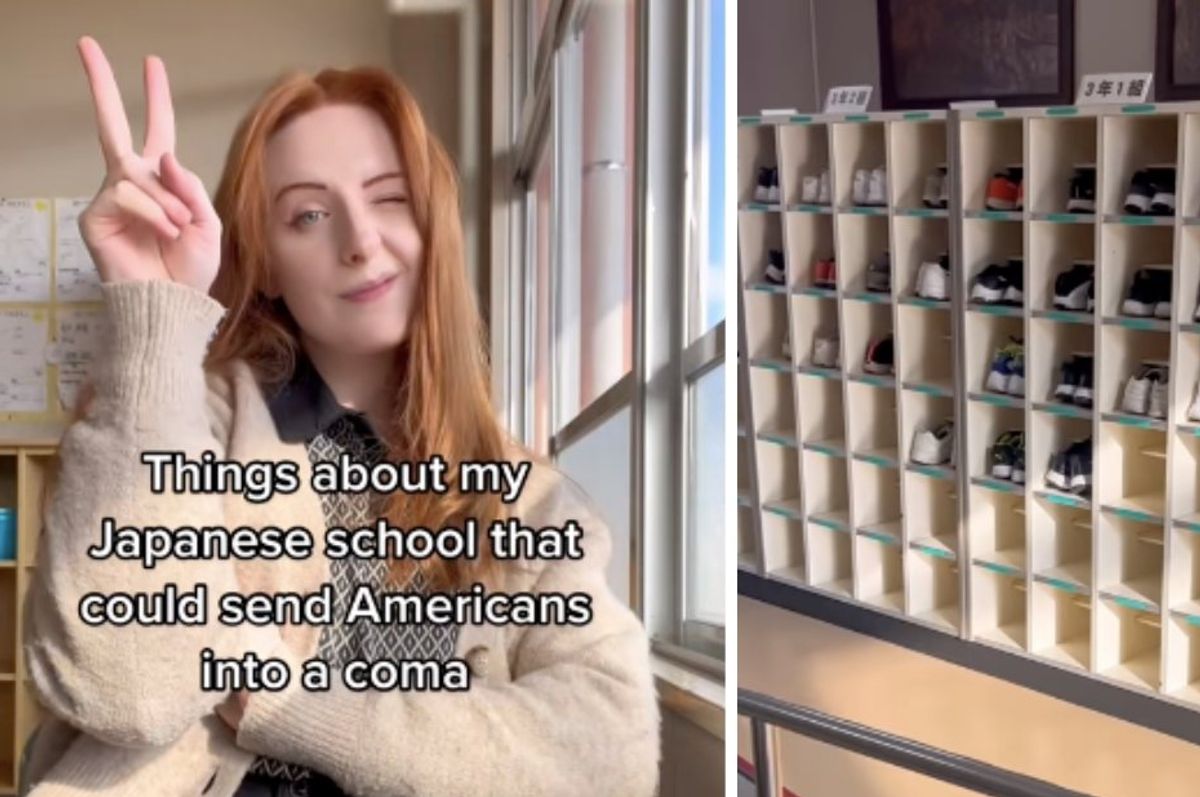
When you live in the same country your whole life, it’s easy to think of things as “normal” simply because it’s the way they’re always done. One of the best ways to divest yourself of that notion is to go live in another country for a while, because very quickly, you start to see things you thought of as a given—or never thought about at all because it never dawned on you that they could be different—are actually cultural norms that don’t exist everywhere.
An American teacher who lives in Japan offers a perfect example of how the norms of different countries can contrast sharply.
On her TikTok channel, @hito.bito, the teacher shared a video called “Things about my Japanese school that could send Americans into a coma,” and the differences she described are mind-blowing.
She begins with, “We all have to change from outdoor to indoor shoes as soon as we enter the school. And no, I’ve never seen any love notes or confessions in the shoe cubbies.” She shows herself changing into comfy slippers after entering the school. Definitely a good way to keep the floors cleaner.
Not that cleanliness is an issue for schools in Japan, since the students—not janitors, the students—clean the whole school daily.
“You don’t know clean until you’ve been to a Japanese school because these kids clean the school from top to bottom every single day,” she shared.
People familiar with the Montessori approach to education are familiar with the idea, but it’s not at all the standard practice of most public schools in the U.S. Perhaps it should be?
Another difference she pointed out was the lunch kids are served—or rather that they serve themselves. Usually, it’s some kind of rice, vegetables and protein, and it all looks delicious.
Of course, not every difference is a positive.
“Now, what sends me into an absolute spiral almost daily is that they leave the windows open and there’s no heating or cooling in the hall so I have to walk around in a coat,” she shared, showing herself wearing a parka indoors. This practice probably has more to do with Covid and air circulation than a cultural norm (I lived in Japan 20 years ago and don’t recall this being a regular practice), but even taking proactive steps to keep the air clean is a far cry from schools here, even in the Covid era.
She also shared some hair, makeup and piercing rules that are far stricter than most schools in the U.S. (She stated in a later video that the reason for the low ponytail rule is that kids are required by law to wear helmets when biking and most Japanese kids bike to school, so the hairstyle rule allows for safe helmet use.)
Watch:
@hito.bito Had a stroke when the school lunch was this good #japantravel #japanlife #gingerinjapan #japaneseculture
People in the comments loved certain parts of Japanese school protocol, but others not so much. The consensus is that the cleaning habits are awesome—pretty much everyone felt that American kids should be cleaning their schools as well. The shoe change was a popular idea, too. Several Canadian commenters said they do that up north as well.
The hair, make-up and piercings, however, people were not so fond of. Americans do treasure our individuality and freedom to express ourselves. That’s a norm that’s pretty unshakable here.
We all have things that we can learn from one another, and when we share our customs and norms, sometimes we can find ways to improve or enrich our own culture. Now it’s just a matter of figuring out how to make the kids-cleaning-the-school thing happen in the US…
